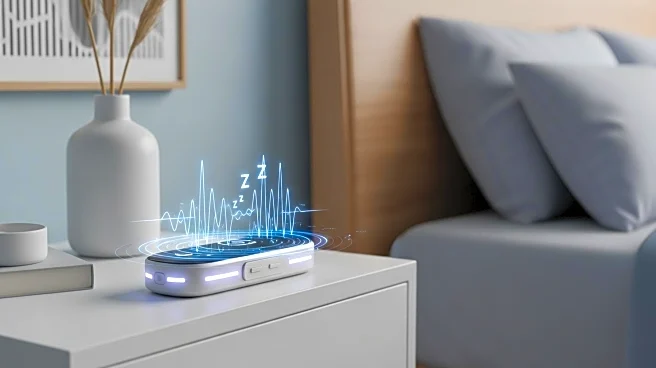What's Happening?
SleepSpace, an AI-powered application, is designed to analyze sleep patterns and provide personalized recommendations to users. Founded by Dan Gartenberg, the app integrates with wearables like Apple Watch and Oura to offer a comprehensive view of sleep habits. Users can trial the app for seven days before committing to a subscription. The app's AI, named Dr. Snooze, offers instant, science-based recommendations and can escalate queries to human sleep experts if needed. The app tracks sleep disturbances and quality using a phone's microphone and motion detector, providing users with a personalized sleep score and insights into their sleep patterns.
Why It's Important?
The introduction of AI in sleep analysis represents a significant advancement in personal health monitoring. By providing users with detailed insights into their sleep patterns, SleepSpace empowers individuals to make informed decisions about their sleep health. This can lead to improved overall well-being, as quality sleep is crucial for physical and mental health. The app's ability to integrate with popular wearables enhances its utility, making it a valuable tool for those seeking to optimize their sleep without investing in additional hardware. The involvement of human experts ensures the accuracy and reliability of the recommendations, addressing potential limitations of AI.
What's Next?
As SleepSpace continues to evolve, it may expand its features and integrations with other health monitoring devices. The app's developers might also explore partnerships with healthcare providers to offer more comprehensive sleep health solutions. User feedback could drive future updates, enhancing the app's functionality and user experience. The growing interest in personal health technology suggests a promising market for SleepSpace, potentially leading to increased adoption and further innovation in AI-driven health applications.
Beyond the Headlines
The use of AI in sleep analysis raises questions about data privacy and the ethical implications of health monitoring. Ensuring user data is protected and used responsibly will be crucial as such technologies become more prevalent. Additionally, the reliance on AI for health recommendations highlights the need for transparency in how these algorithms are developed and validated. As AI continues to integrate into personal health management, balancing technological advancement with ethical considerations will be essential.











